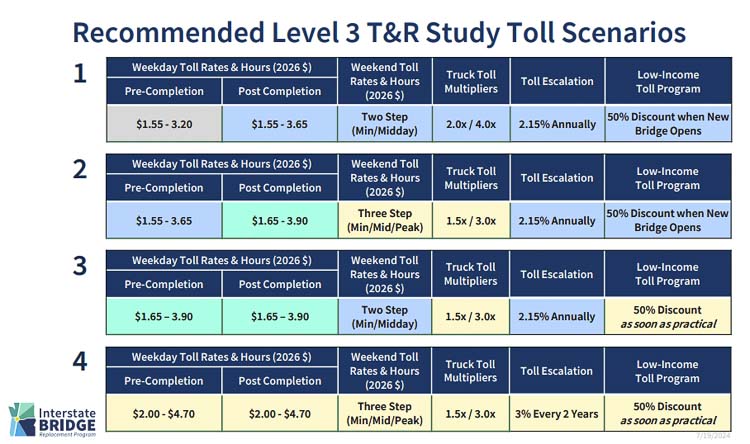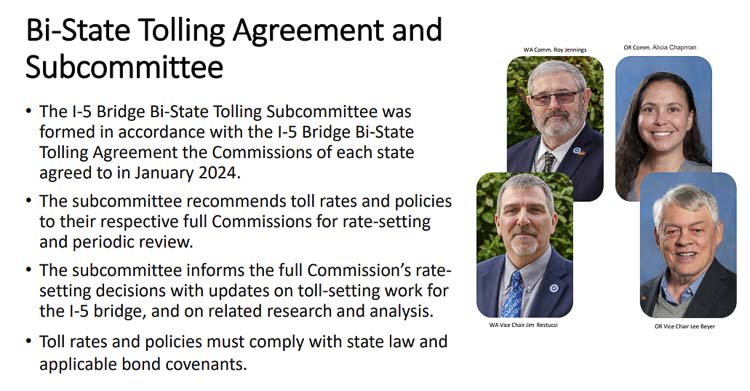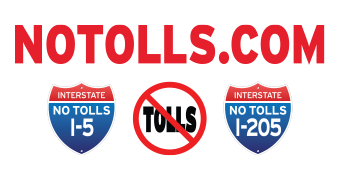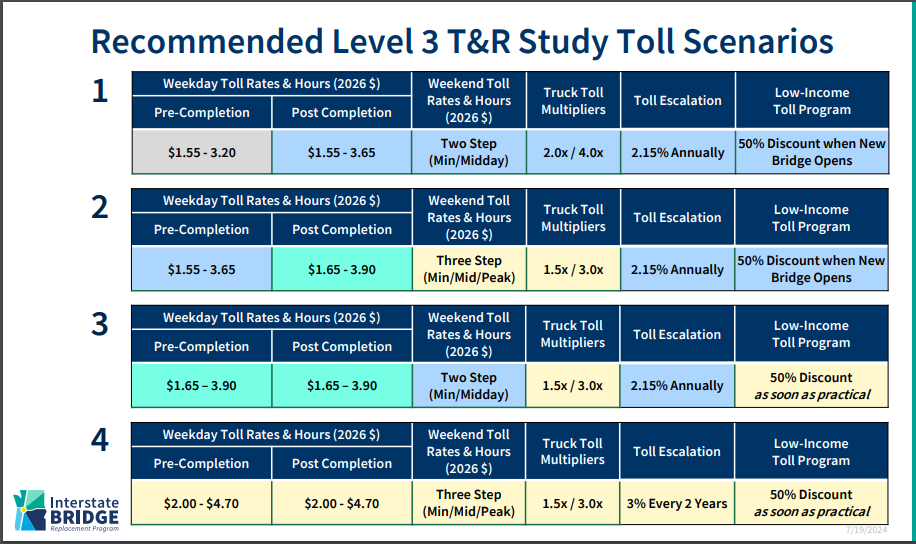Freight haulers could pay up to four times that amount in ‘pre-completion’ tolling
John Ley
for Clark County Today
A subcommittee of Washington and Oregon Transportation Commissions met to discuss tolling on the Interstate 5 Bridge. Tolling would begin “pre completion” of the Interstate Bridge replacement project, with further escalation of toll prices once the new facility opens after 9 to 15 years of construction. The finance plan for the bridge calls for borrowing up to $1.6 billion from Wall Street, paid back by tolling revenues.
Four scenarios were discussed and approved for further evaluation by the subcommittee. One-way tolls would range from $1.55 to $4.70 during “pre completion” construction, beginning in late 2025 or early 2026. Freight haulers would pay 1.5 to 4 times the agreed toll costs. Toll rates would escalate 2.15 percent annually in three scenarios, and 3 percent every two years in the fourth scenario.
At $4.70 each way, that equates to $9.40 a day, $47 per week, and $2,350 per year (50 weeks). In the Columbia River Crossing (CRC) effort over a decade ago, it was estimated at least 60 percent of tolls would be paid by Washington state residents.

The original Interstate Bridge Replacement Program (IBR) proposal called for borrowing between $1.2 billion and $1.5 billion. Now the high end has increased to $1.6 billion. Program administrator Greg Johnson reports the cost of the current $7.5 billion project is going up, but won’t reveal details until the summer of 2025.
An additional concern is traffic diversion, as citizens choose to use the I-205 Glenn Jackson Bridge to avoid paying the tolls. No current data is available, but in the CRC it was projected that up to 35,000 vehicles would divert and use I-205. That would clog east-west transportation corridors on both sides of the Columbia River which are already congested. Both the I-5 and I-205 bridges reached their design capacity roughly a quarter century ago.
During public comments, there was pushback from citizens on both sides of the river. “I now have to get specialty care at OHSU,” said Vancouver resident Debra Kalz. “I’m very concerned about having to pay tolls to go over and get my medical care.”
“Our people, they don’t want to pick up the toll rates,” said Paul Edgar of Oregon City. “They don’t want to pick up the cost for operating the toll.” He also told commissioners he objects to adding light rail to the bridge.
“It adds three billion to the total cost,” Edgar said. “WSDOT (Washington State Department of Transportation) will pay some of that, ODOT (Oregon Department of Transportation) will pay some, but a significant portion will have to be paid by tolls.”
“Without having a vote of the people to subsidize light rail, you’re barking up the wrong tree,” he said. “It should be eliminated from the proposal.”
Eight months ago, a public survey sponsored by West Linn, Oregon City, Tualatin, and Wilsonville reported 82 percent of respondents said public transit would not provide a viable alternative to avoid tolls. Another 80 percent cited opposition to the tolls because of increased traffic and safety concerns.
Dean Suhr is with an Oregon group (Vote Before Tolls) hoping to get a ballot measure qualified to force a vote of the people before a decision is made to toll the bridge. His IP-31 will collect citizen signatures of Oregon voters next year.
“It’s going to force transparency and accountability,” said Suhr, who paused signature collection on a similar measure when Governor Tina Kotek stopped congestion pricing toll collection on I-205 in Clackamas County. She allowed tolling for the Interstate Bridge to continue.

“The state’s path toward implementing tolling is uncertain at best,” Kotek wrote in a letter to the OTC. “After years of work, the challenges of implementing the RMPP (Regional Mobility Pricing Program) have grown larger than the anticipated benefits. Therefore, I believe it is time to bring the agency’s work on RMPP to an end and delay additional expenditures for implementation of tolling on I-205 to the future when the legislature can further evaluate and provide clearer direction on tolling,” she wrote.
Polling indicated that between 70 and 90 percent of Portland area voters object to tolling as a means of raising transportation dollars. The cost of collecting I-205 tolls was initially estimated to be 83 to 86 percent of funds, leaving little to actually pay for the proposed construction.
The I-5 Bridge Toll Authorization has occurred by both states. The Washington State Legislature authorized tolling for the project in 2023 (RCW 47.56.902). The legislation:
- Authorizes tolling on the existing and replacement I-5 bridges.
- Toll revenues must be spent on construction, maintenance and operation of the toll facility.
- Prohibits tolls on the Washington portion of I-205.
The Oregon legislature in 2013 Oregon authorized tolling for the Columbia River Crossing project, included language related to tolling the Interstate Bridge (HB 2800).
- Tolls are to be used only to fund the project, must meet requirements for debt issued for the project and must pay for maintenance and operation of the project
- Tolls must consider traffic demand management
- Tolls must be reduced after paying off construction
The subcommittee plans for adoption of final toll rates in the summer of 2025.


